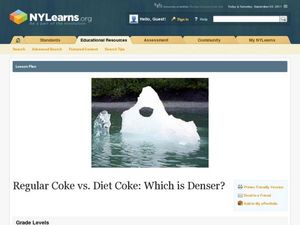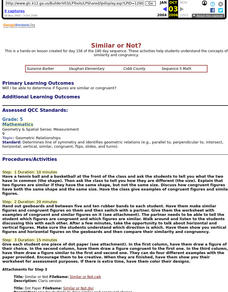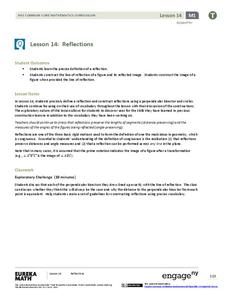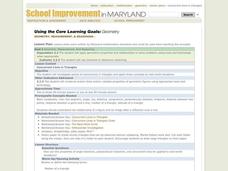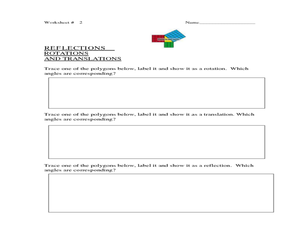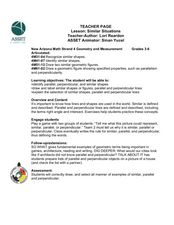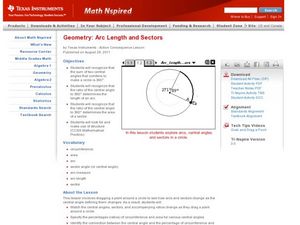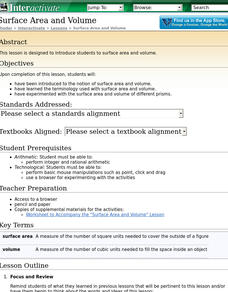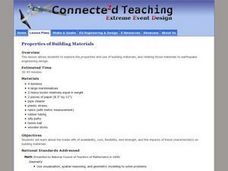Curated OER
An Introduction to Quadrilaterals
Students explore different types of quadrilaterals. Students define the terminology used with quadrilaterals. They create particular quadrilaterals based on specific characteristics of the quadrilaterals using an online tool.
Curated OER
Surface Area of Rectagular Prisms
Sixth graders investigate the area of polygons. In this geometry lesson, 6th graders calculate area of prisms using geometric formulas. They work with prisms and other rectangular shapes.
Curated OER
Investigating Nets and Polyhedra
Fifth graders create a net for a given polyhedron. They determine the corresponding polyhedron for a given net. Students investigate several polyhedra (cube, tetrahedron, and one of their choosing) and their corresponding nets. They...
Curated OER
Regular Coke versus Diet Coke, Which is Denser?
Students investigate the density of liquids. In this geometry lesson, students calculate the volume and differentiate between volume, mass and density. They observe similarity and differences between coke and diet coke.
Curated OER
Length, Perimeter, and Area
Students explore the concepts of length, perimeter and area. Students develop an understanding of length, perimeter, and area. Students calculate the area and perimeter of random shapes and calculate the area and perimeter of a triangle...
Curated OER
3-D Figures Part 2
Students work with three dimensional objects. In this geometry lesson, students examine models of spheres, cones, cubes, prisms, and pyramids, and identify them by their edges, vertices, and faces.
Curated OER
From Molecules to Mole Day Do's
Students recognize methods used to define the mole. After converting various quantities to the mole, students provide a context for understanding the usefulness of scientific notation and the mole.
Curated OER
Similar or Not?
Fifth graders define the meaning of similar and congruent using concrete objects. They make similar and congruent figures using geoboards. They draw their figures on dot paper, and color their designs.
EngageNY
Construct and Apply a Sequence of Rigid Motions
Breaking the rules is one thing, proving it is another! Learners expand on their previous understanding of congruence and apply a mathematical definition to transformations. They perform and identify a sequence of transformations and use...
EngageNY
The Definition of Sine, Cosine, and Tangent
Introduce your classes to a new world of mathematics. Pupils learn to call trigonometric ratios by their given names: sine, cosine, and tangent. They find ratios and use known ratios to discover missing sides of similar...
EngageNY
Reflections
Facilitate creativity in your math class as individuals learn the definition of a geometric reflection and correctly construct a model, as well as its reflected image. They use a perpendicular bisector and circles to elaborate on...
Shodor Education Foundation
Pythagorean Theorem
Most adults remember learning about the Pythagorean theorem, but they don't all remember how to use it. The emphasis here is on developing an intuitive understanding of how and when to use the theorem. Young mathematicians explore...
Curated OER
Constructions, Sketches, and Drawings
High schoolers explore the concept of constructions, sketches, and drawings. In this constructions, sketches, and drawings activity, students discuss the differences between constructions, sketches, and drawings through teacher led...
Curated OER
Concurrent Lines in Triangles
Students explore the concept of concurrent lines in triangles. In this concurrent lines in triangles lesson, students work in groups to investigate properties of concurrent lines in acute, right, and obtuse triangles. Students use a...
Dick Blick Art Materials
Start with a Circle...
The Golden Ratio. The Divine Proportion. Yup. It's math and art blended into one colorful activity. Young artists combine colored tissue paper circles and parts of circles to create geometric patterns. As a bonus, kids get to figure out...
EngageNY
The Motion of the Moon, Sun, and Stars—Motivating Mathematics
What does math have to do with the behavior of the earth and sun? Learn how the movement of celestial bodies has influenced the development of trigonometry. Scholars connects the details in mathematics to their...
Curated OER
Point Comparisons
Young geometers investigate two-dimensional figures using coordinate grids. They identify polygons and draw examples of their reflection, rotation, and translation on a coordinate grid. And they complete a worksheet practicing examples...
Curated OER
Similar Situations
Students explore intersecting lines. In this intersecting lines lesson, students investigate shapes consisting of parallel, perpendicular, and similar lines. Students investigate these lines in shapes around them.
Curated OER
Finding Area of Similar Figures
Students explore the concept of finding area of similar figures. In this finding area of similar figures lesson, students use pattern blocks to construct similar figures. Students trace their construction and find the area. Students...
Curated OER
Triangle Midsegment
Learn how to calculate the length and midsegments of triangles. Students differentiate between similar and congruent triangles. They create a spreadsheet with their findings.
Curated OER
Arc Length and Sectors
Find the length of an arc. High schoolers relate central angles to the area and length of a sector and graph circles on the TI to make predictions.
Curated OER
Surface Area and Volume
Students are introduced to the notion of surface area and volume, learn the terminology used with surface area and volume and have experimented with the surface area and volume of different prisms.
Curated OER
Angles That Pair
Students identify angles. In this angles that pair lesson, students identify adjacent, vertical, complementary, and supplementary angles. They use straws, pretzel sticks to demonstrate given types of angles.
Curated OER
Properties Of Building Materials
High schoolers investigate the concept of building materials and how they are used to create different things. They focus upon the availability, cost, flexibility, and strength of different building materials. This is done by taking part...



